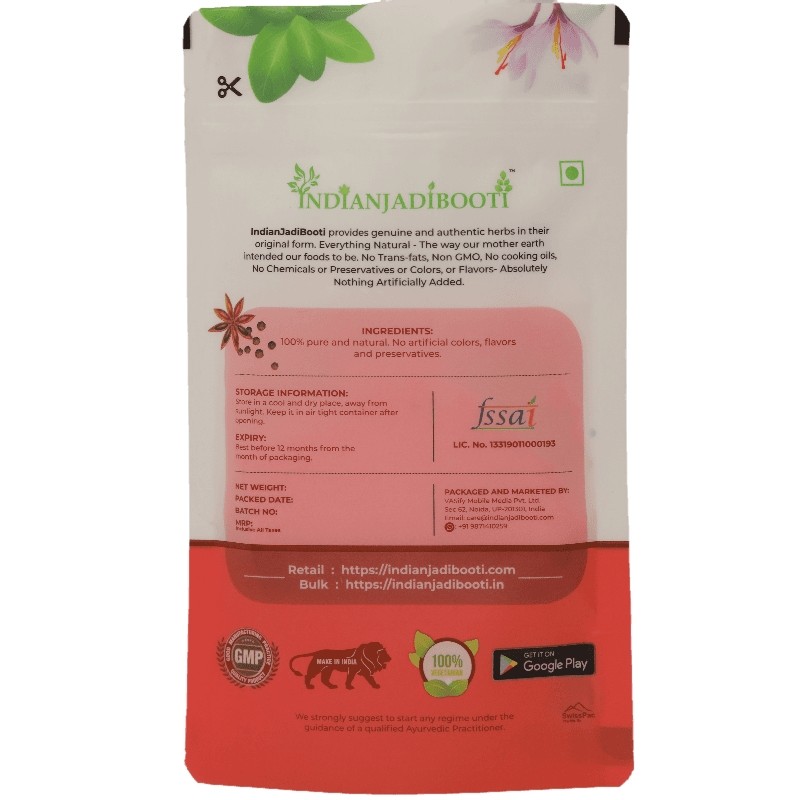

















- Stock: In Stock
- SKU: HERB000043
- Shipping: Free within India upto 10KG
- Quality: Premium Herbs with No Adulteration
- Delivery: Within 3 to 7 Working Days in India
- Shipping: From Delhi based Facility
- Transport Charges for 25KG and above: Extra on To Pay
- COD Available: Max Limit: 2 Kg and Rs 3500 per order
- Discount on Prepaid Orders: Rs 50/- off. Auto Apply on Checkout.
Available Options
Description
The Ficus religiosa, commonly known as the Pipal tree, has great cultural, religious, and medicinal importance in different societies, particularly in South Asia. It is considered sacred in Hinduism, Buddhism, and Jainism, and all its parts, such as the bark, leaves, and roots, have various health and beauty advantages.
Health benefits:
Anti-inflammatory:
The compounds found in pipal bark have strong anti-inflammatory properties. These properties can aid in diminishing inflammation linked to conditions such as arthritis and inflammatory bowel disease.
Digestive aid:
Pipal bark has a long history of being utilized for easing digestive problems like bloating, gas, and indigestion. Its role involves calming the gastrointestinal tract and enhancing digestion.
Respiratory health:
Traditional medicine uses the bark to address respiratory conditions such as asthma and bronchitis, utilizing its expectorant properties to alleviate breathing difficulties by loosening phlegm.
Skincare:
Pipal bark extract, whether used on the skin or taken internally, can improve skin health by decreasing inflammation, addressing acne, and encouraging a smoother complexion.
Haircare:
Pipal bark extract provides benefits for promoting hair growth and maintaining scalp health. It feeds hair follicles, fortifies roots, and averts hair loss.
UV Protection:
Pipal bark extract, when used on the skin, offers a degree of defense from UV radiation, thereby lessening sun damage and minimizing dark spots.
Here are some of the names by which the pipal tree is referred to across different states of India:
● Hindi: Pipal
● Bengali: Ashwattha
● Telugu: Bodhi
● Tamil: Arasa Maram
● Kannada: Ashwattha
● Malayalam: Arayal
● Gujarati: Peepalo
● Marathi: Ashwattha
● Odia: Ashwatha
● Punjabi: Bohar
In summary, the pipal tree, particularly its bark (Chaal), provides numerous health and beauty benefits supported by centuries of traditional use and contemporary research. Whether used internally or externally, integrating pipal bark into your health and beauty routine can support general wellness and improve your innate glow.
Other Names: Bodhi, pippala, peepul, peepal, ashwattha, Beepul tree, Pipers, Pimpal, Jari, Arani,Ashvattha, Ragi, Bodhidruma, Shuchidruma, Pipalla, Ashvattha, Peepal, holy fig tree, peepul, sacred fig tree, ahot, pippol, asbattha, asvattha,, piplo, aswattha,, aralimara,, asvatthamara, ashvata ruku, pimpal, arayal, pippalam, sana khongnang, ashwattha, pimpala, hmâwng , ashvattha, pippala, bodhivriksha, plaksha, araca-maram, pippalam, pippalamu, Ravichettu, Pippal, Pipal Chaal , Peepal Bark , Ficus religiosa, Pipal Chhal , Pipal Chal, Peeple Bark, Pipal Chilka pipal chaal peepal bark pipal chhal ficus religiosa jadi buti raw herbs, Pepal Chal pipal chaal peepal bark pipal chhal ficus religiosa raw herbs pipal chaal, Pippal, Arasam, Bodhi, Sacred Fig, Peepul, Pipala, Ashvattha, Asvattha, Ashwatha, Ashvatha, Aswatha, Asvatha, Ashwath, Ashvath, Ashwattha, Aswattha, Ashwatha Twak
Reviews
100% Customers recommend this product
-
5 Awesome88.89%
-
4 Great11.11%
-
3 Average0%
-
2 Bad0%
-
1 Poor0%
Reviews Over Pipal (Chaal) - Peepal Bark - Pipal Chhal - Ficus Religiosa by IndianJadiBooti
- (4.89)
Total Reviews (9)
click here write review to add review for this product.
-
(0)
-
(0)
-
(0)
-
(0)
-
(0)
Report this review.
FAQ
The Peepal tree not only releases oxygen but also offers numerous valuable therapeutic properties. Various components of the tree, including the bark of its roots and stem, as well as its roots, leaves, and fruits, are utilized to address health issues such as elevated blood glucose levels, digestive problems, and respiratory difficulties. Additionally, the Peepal tree proves helpful in treating various skin conditions.
Research has shown that F. religiosa serves as a valuable resource in traditional medicine for addressing various health conditions. This plant has been utilized to treat respiratory issues like asthma, manage blood sugar levels in diabetes, alleviate gastrointestinal problems such as diarrhea, and mitigate seizures in epilepsy. Additionally, it has been employed to tackle gastric ailments, reduce inflammation, combat infections, and address sexual dysfunctions.
Known as Ficus religiosa, the Peepal tree holds great religious significance in Hinduism, Buddhism, and Jainism. This revered tree is often associated with qualities such as longevity, wisdom, and protection.
The leaves of the Peepal tree contain significant amounts of glucose, asteroid, mennos, and phenolic compounds. Meanwhile, its bark is abundant in vitamin K, tannin, and phaetosteroline. These nutritional components contribute to the tree's classification as a medicinal plant.
The Ficus Lyrata's expansive foliage generates substantial amounts of oxygen through the process of photosynthesis. This plant produces sufficient oxygen to promote a relaxed state in the brain, facilitating deep, restorative slumber. Research indicates that enhanced sleep quality is linked to improved cognitive function and increased productivity.
For treating liver and spleen ailments: Gather 3-4 fresh Peepal leaves and combine them with crystal sugar. Grind this mixture into a fine powder. Dissolve the powder in 250 ml of water and strain the solution. Administer this liquid to the patient twice daily for 5 days. This remedy is particularly effective for individuals suffering from jaundice.















